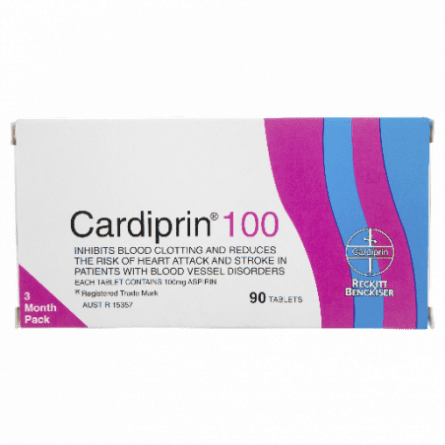ALWAYS READ THE LABEL AND FOLLOW THE DIRECTIONS FOR USE
Client Service
clear
Client Service
Our Contacts:
Mon-Fri: 9:00 am - 7:00 pm
Sat: 9:00 am - 4:00 pm
Sun: 9:00 am - 2:00 pm
8-100-9000-300
demo@demo.com27 Oak Street, Tenafly, US, 07670
Delivery:
Free delivery all orders of $120 or more of eligible items across any product category qualify
Payments:
Credit Card: Visa, MasterCard, Maestro, American Express
Return Policy:
You can return any item purchased within 16 days of the delivery date
Client Service
Cardiprin 100mg 90 Tablets
$9.99
Tax included
$11.99
Save $2.00
Cardiprin 100 inhibits blood clotting and reduces the risk of heart attack and stroke in patients with blood vessel disorders.
| Brand | Cardiprin | ||
| Reference # | 100575 | ||
| Barcode (EAN) | 9300631015185 | ||
| Availability | In Stock | ||
Cardiprin 100 (Aspirin 100mg). Preventing strokes and heart attacks. What causes strokes and heart attacks? As we grow older, our arteries tend to narrow as fatty and fibre-like materials build up on the inner walls. If an artery gets sufficiently narrow, a blood clot may form and block the artery. If this occurs in an artery supplying blood to the heart muscle, it will restrict the heart's supply of oxygen, causing angina (a crushing chest pain) or a heart attack. If this occurs in an artery bringing blood to the brain, it can cause a TIA (Transient Ischaemic Attack) or a stroke. How can Cardiprin 100 help? Cardiprin 100 reduces the stickiness of platelets (the clot-forming part of blood), making them less likely to form a clot and helping to prevent blocking of blood vessels. Each tablet contains 100mg of Aspirin, a low dose shown by medical studies to effectively lower the risk of stroke and heart attack in people who have blood vessel disorders, with a low risk of side effects. Cardiprin 100 has also been specially formulated to dissolve on the tongue for rapid absorption. Some scientists believe that aspirin which is rapidly absorbed may be more effective in the prevention of strokes and heart attacks. How often and for how long should I take Cardiprin 100? Because your body makes new clot-forming platelets every day, you must remember to take Cardiprin 100 on a daily basis. Cardiprin 100's calendar pack is designed to help you remember your daily dose. Simply disperse the tablet on your tongue without water. It is pleasant-tasting and easily swallowed. Or, if you prefer, you can swallow your Cardiprin 100 tablet whole with some water. Your doctor will advise you on how long you should continue to take Cardiprin 100. Make sure you see your doctor at regular intervals and discuss any questions that you may have with him or her. Cardiprin 100 should only be taken under medical supervision. What else can I do to lower my chances of heart disease and stroke? There are few things you can do to further lower your risk of heart attack and stroke while taking Cardiprin 100. Have a blood pressure checked on a regular basis. Don't smoke. Maintain a normal weight. Exercise on a regular basis. Reduce your intake of fatty foods.
Adult dose: One tablet daily.Children: Not recommended for children and teenagers.It is important to take your Cardiprin 100 tablet each day and ideally at about the same time.How to use your Cardiprin Calendar Pack:Start with the tablet in the section marked 'Take first.' On the next day, take the next tablet that corresponds with the day of the week. Follow the arrows around the pack, taking one tablet each day, until all tablets marked with the day of the week have been taken.To finish the pack, take tablets from the section marked 'Take last.' A new pack should be started on hte next day the same way.Cardiprin 100 disperses instantly on the tongue without water and is pleasant tasting and easily swallowed.Cardiprin 100 tablets do not dissolve in water. However, if you prefer, they may be swallowed whole with water.
Therapy with Cardiprin 100 should be initiated by a physician. Prolonged use without medical supervision could be harmful.Cardiprin 100 should not be taken by patients who are allergic to salicylates and should be used with caution by patients taking regular anticoagulant therapy. Precautions should be observed in patients with peptic ulcers or asthma.







